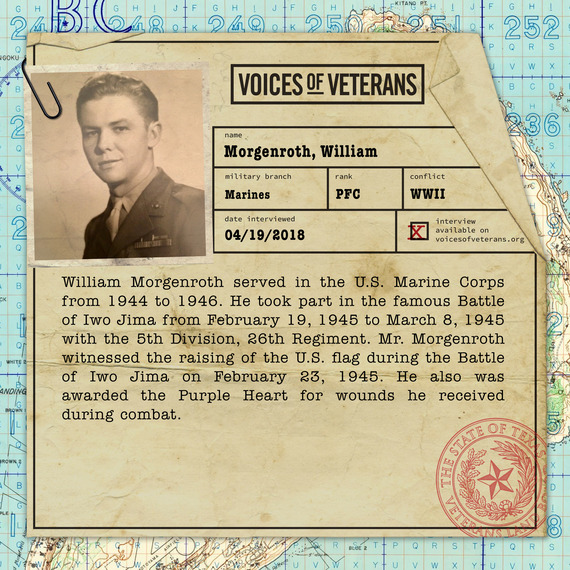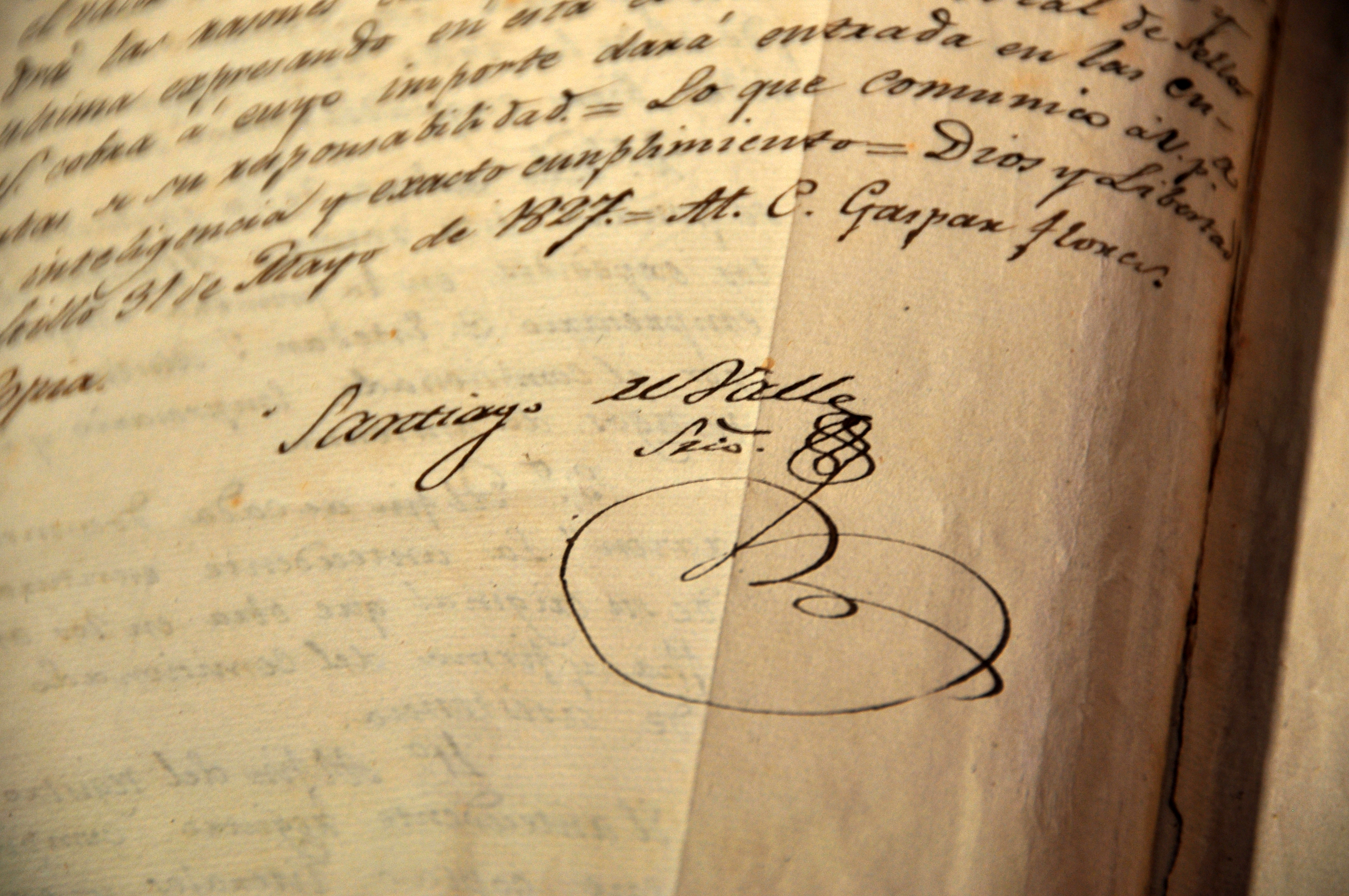AUSTIN — Today, Texas Land Commissioner and Veterans Land Board (VLB) Chairwoman Dawn Buckingham, M.D., is proud to introduce the next installment of the series highlighting the VLB's Voices of Veterans oral history program. This week, we highlight the service of PFC William Morgenroth who served in the U.S. Marines and witnessed the raising of the U.S. flag during the Battle of Iwo Jima on February 23, 1945.
Morgenroth was born in Chicago, Illinois and following graduation from high school, Morgenroth said he went to various schools put out, he said, by Bell Telephone Company where he gained an education about telephones. It was while there, when the attack on Pearl Harbor happened.
"I was in Hammond, Indiana working for Bell Telephone company in 1941," he said. "I heard about it on the car radio headed to work and then heard about it in the newspaper. It was big news everywhere."

Morgenroth talked next about the process of being drafted but then being pulled out of the draft to volunteer for the U.S. Marines.
"I was drafted and two of us were pulled out of the draft in downtown Chicago and they told us we were eligible for the Marine Corps. You see, in the Marine Corps, if you're not drafted, you can volunteer, so they said if you want to volunteer you're eligible but they didn't tell me what eligible meant," Morgenroth explained, adding that's what he decided to do regardless of his understanding.
Morgenroth said he would attend boot camp for the U.S. Marine Corps in San Diego before heading to Camp Pendleton. He said he was pretty good at mechanics and electronics and he helped to fill some vacancies they had.
"I was part of a special group, which was demolition, mainly it was these pill boxes that the Japanese had on the island and we were trying to blow them up," he explained. "We had flamethrowers, we were supposed to be able to demolish buildings. We also had this rocket launcher, which was called a Bazooka at that time but that was the group I was in."
Morgenroth said following Camp Pendleton, he was sent to Camp Tarawa, a training camp located on Hawaii and was constructed and used by the 2nd Marine Division during World War II. The grounds of the camp were situated between the volcanic peak of Mauna Kea and Kohala mountain.
"We played war games there," Morgenroth said, adding he didn't know what was coming. "We didn't quite know where we was going but we knew something big was coming because they didn't want the people in the military to know every detail of what's happening because it might filter back in to the intelligence of the Japanese."
Morgenroth said he had known he would be headed to Iwo Jima since Camp Pendleton because of his selection to go to Camp Tarawa for further training. He said the war games helped them prepare for what was ahead.
"We did a lot of island hopping and by playing war games, we took islands -- military-wise we took islands before we went to Iwo Jima. Iwo Jima was getting pretty close to Japan, it was only about 200 miles away."
Morgenroth said on their way to Iwo Jima they received books on how to speak Japanese and also got an indication on how the Japanese were set up for an invasion. "They had all those tunnels set up on the island and it was tunneled out tremendously, and it was going to be a bad place because they were underground and they had all that protection."
Morgenroth said they knew from extensive surveillance the Japanese were expecting them and that a bad situation was expected because they were so well protected underground. He arrived, he recalled the very first day the invasion occurred and hasn't forgotten the events that unfolded.
"The first wave of Marines went in about eight in the morning, I went in with a wave that came in at just about noon and I was there for almost the whole operation," he explained, adding the living conditions were awful. "We lived in a foxhole if we were lucky, it was terrible, there was bodies everywhere, I never saw so much blood in my life. It was hard."
Morgenroth spoke at length about his time on Iwo Jima and trying to stay alive against the Japanese forces he credited with being as tough and resilient.
"Sometimes, at night, the Japanese would be moving forward and, you see, they'd get separated from their own units and they'd go through some of the areas we were in," he explained. "If they would come at night, we would put bayonets on our M1 rifles and if they happen to fall in our foxhole, you might stab em, it was terrible. Many of those things happened around us, it was a bad situation."
Morgenroth said he was there the day the famous photograph of the raising of the U.S. flag at the summit of Mount Suribachi was taken. The flag, he said, was raised by six U.S. Marines becoming a famous image of the battle and the American war effort in the Pacific.
"I saw that flag from the bottom, we were at the base of that, and I looked up and I saw that flag and I was glad to see it because that mountain, Mt. Suribachi, that was all hollowed out with Japanese and all kinds of weapons and they could shoot the Marines from there," he explained. "I was sure glad to see that flag there because I thought that we now own that mountain, it wasn't the Japanese."
To listen to PFC William Morgenroth tell His story, click the button below:
PFC William Morgenroth's Story
RELATED: Voices of Veterans: Clovis Thompson Shares His Story of Service in the U.S. Marines During WWII
Veterans can email VoicesofVeterans@glo.texas.gov to tell their stories. Please note that the Veteran must be a resident of Texas at the time of their interview.
Voices of Veterans is a state agency's first Veteran oral history program. It records the stories of Texas Veterans through their time in service and after returning home from combat.
The VLB records interviews with Veterans over the phone or in person. Their interviews are then permanently archived in the Office of Veterans Records at the GLO, where they join the historical documents of other Texas heroes such as Sam Houston, Davy Crockett, Jim Bowie, and William Barret Travis.
Veterans' interviews are also available to researchers, historians, genealogists, and the public. These precious records inspire future generations and remind us of our Veterans' sacrifices.
To listen to the over 500 archived stories of Veterans documented through the GLO's Voices of Veterans oral history program, click the button below:









